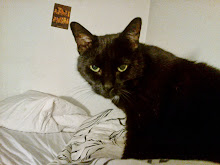
The book: Stephen King's 1408 first appeared in his non-fiction book On Writing as an example of how a book develops from first to second draft. King decided to expand it into a short story, which was then published in the collection Everything's Eventual (2003) along with 13 other stories. Before that, it appeared in an audio book called Blood and Smoke (1999).
The movie: 1408 came out in 2007. The screenplay was written by Matt Greenberg, Scott Alexander and Larry Karaszewski. The movie was directed by Mikael Håfström and starred John Cusack and Samuel L. Jackson.
Plot/character differences: The basic idea of "horror writer who believes in nothing enters haunted hotel room" is the same in both, but the details are very different. The story in the book is pretty short and relies mainly on atmosphere; there isn't a lot of plot there, and the part where Mike stays in the room is quite short. We don't find out much about his life either before or after entering the room. In the movie, Mike's life story is explored in more detail, and it also affects his hallucinations in the room. The plot about the dead daughter and estranged wife only exists in the movie, just like the father in an institution and the first "serious" book he wrote. There are two alternate endings, neither of which is exactly the same as in the book. In the short story, Mike escapes the room but is left with burns, traumas and health problems, including a complete inability to write. In the movie, however, Mike either dies in the room (director's cut) or escapes to write a book about his experiences (theatrical version).
Besides adding the ex-wife, daughter and father, there aren't too many character differences. The agent is expanded into a much more interesting character, and the timid but earnest hotel manager is changed into a very confident and pretty ominous one. The main focus, however, remains on the character of Mike Enslin who stays pretty true to the book's description.
Author opinion: The script was sent to Stephen King for approval before making the movie, and he okayed it. That's all I know about it. Apparently the filmmakers are King fans, and John Cusack praised him as a genius at writing characters.
My opinion:
This may not be the most faithful King adaptation in terms of plot and characters, but it is one of the most faithful adaptations of the mood of a story. The film 1408 left me with the same dreary feeling as the short story; both stayed in my mind for a while, and both are somehow fundamentally depressing, yet also fascinating.
I saw the movie first, and my initial reaction to the short story was amazement at how different the stories were. The original is quite short and concise, and doesn't give a very long account of Mike's stay in the room. The movie focuses almost exclusively on his time in the room and only gives a short, not-in-the-book interlude where Mike visits another "haunted" hotel and talks about his lack of faith in a book signing.
What bugs me is that the movie doesn't share the book's subtlety. The vaguely menacing air of the room is almost ruined with full-on scares and special effects. There are lots of things that never took place in the book: "No one's lasted more than an hour." The clock radio. The woman with the hammer. Mike seeing himself on the other side of the street (which I liked, actually). The rest of the building disappearing completely. And on and on. Yet some of the most efficient scares in the book - for example, Mike's cut-off head appearing in one of the paintings or the menu with changing courses - are not used. The paintings do turn scary, but somehow it's not executed as well as I'd like; I would have preferred to see the haunting painting with yellowy fruit that was so important in the book. The paintings in the book weren't intrinsically scary, but they had a haunting air about them, something that didn't really come across in the movie, as the paintings were mundane and something you'd normally see in a hotel room. Some great visual opportunities have been lost. Some of the book elements are oddly placed, like the phrase about wolves eating Mike's brother. The effect is not half as strong as it is in the short story, because there's no context to support it.
The acting is superb, not always a given in a Stephen King movie. Mike Enslin is rendered well by John Cusack, and I actually found myself liking him. I rarely like horror movie characters, because they tend to be idiots who go into dangerous places after many warnings and get themselves killed. In this case, however, it seemed to make sense. Mike Enslin has been to too many scary places. He doesn't believe in ghosts. He has no reason to fear room 1408 any more than any other room he's been to. This was well argumented in the book, and it's well argumented in the movie.
1408 the movie isn't a masterpiece, but it's a decent adaptation of a good story. I hope we'll also get to see an adaptation of my favorite story in the same book, Everything's Eventual.


